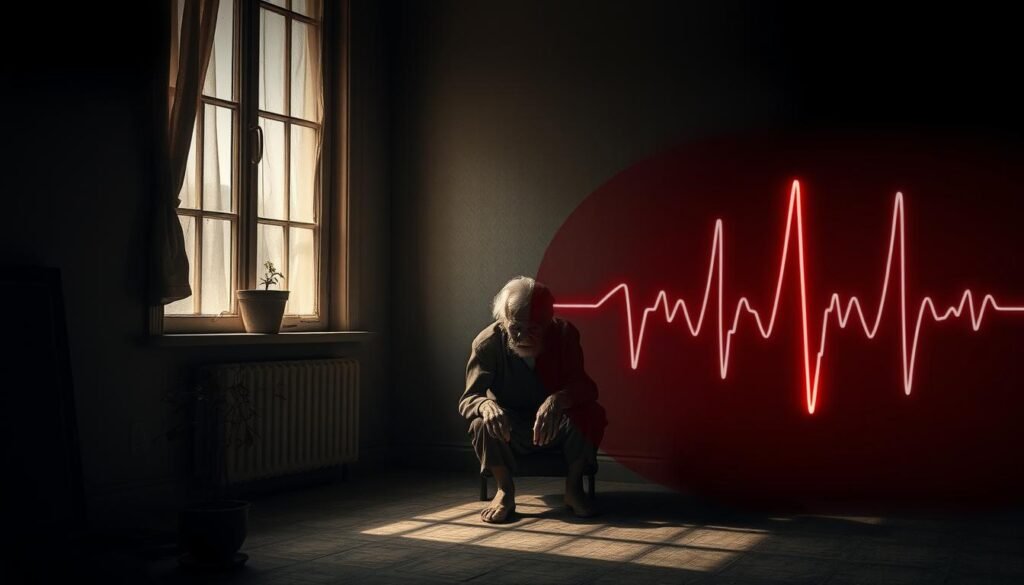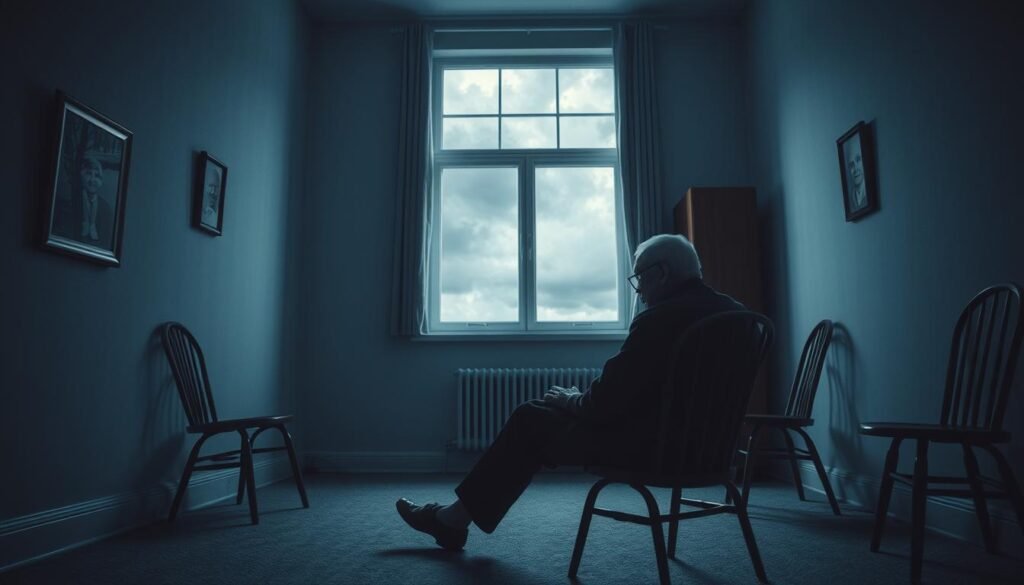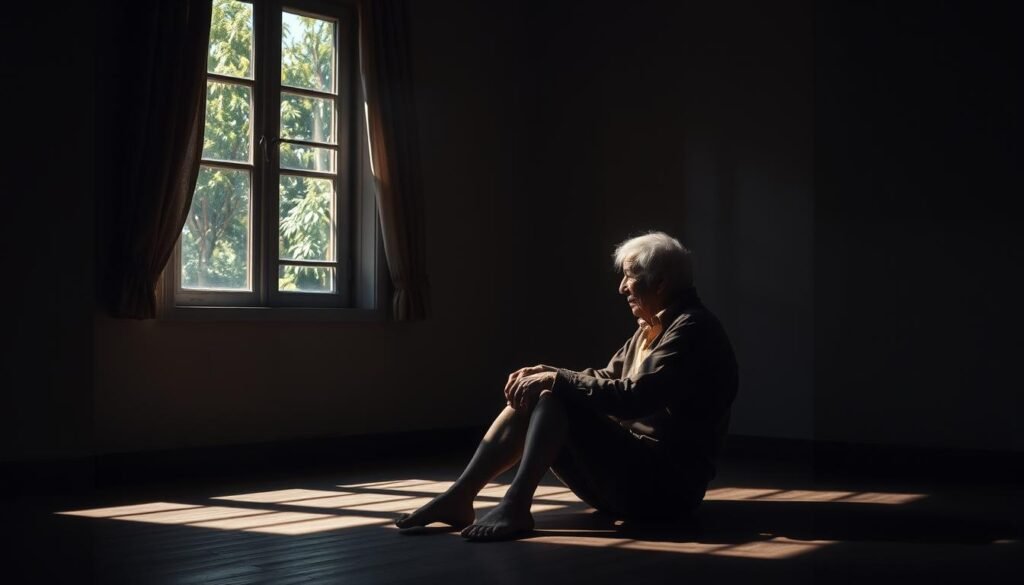Up to 29% of seniors with major depression express a wish to die. This highlights how deeply mental health affects older adults’ survival. It makes us question if depression can lead to death in the elderly. The link between mind wellness and body health plays a big role. Studies show that seniors with depression face a higher risk of dying within two years compared to those without. This makes it crucial for everyone involved in elderly care to understand how serious elderly depression is.
Untreated depression can cause serious health problems, even death. The connection between mental and physical health is clear. Knowing this, it’s key to see elderly depression as an important health issue. To grasp this better, using tools like the Geriatric Depression Scale (GDS) is important. The GDS helps in spotting depression in older adults. For more details, check out this resource.
Key Takeaways
- A significant 29% of elderly individuals with major depression report a wish to die.
- Depression-related deaths in seniors are often linked to untreated mental health conditions.
- Healthcare providers must prioritize mental health screening and intervention.
- Understanding symptoms is essential, as they may differ from those observed in younger populations.
- Addressing elderly depression can lead to improved health outcomes and reduced mortality risk.
Understanding Depression in the Elderly
Depression is a big issue for older adults’ mental health. It shows up in different ways and is often missed. Around 6 million Americans 65 and older are affected by elderly depression. Many don’t realize their symptoms point to depression. They might blame their sadness or tiredness on getting older or other health issues.
Common signs of late-life depression include:
- Persistent sadness or low mood
- Unexplained physical complaints, such as pain or fatigue
- Loss of interest in social activities
- Significant weight loss or changes in appetite
- Sleep disturbances or exhaustion
It’s key to know the symptoms of depression in the elderly for early help. Life stress, like losing a friend, health issues, or less social time, ups depression risks. Also, long-term health problems and some medicines can make sadness or loneliness worse.
Depression and dementia’s similar symptoms make diagnosis hard. Without the right help, elderly depression can cause big mental and physical problems.
To lessen symptoms, trying self-help steps is good. Keep up social ties, stay active, and ask for support. Remember, getting older doesn’t mean you’ll be depressed. Knowing and understanding is key to better mental health for older adults.
Prevalence of Depression Among Older Adults
A significant number of elderly individuals suffer from depression. Research shows about 31.74% of older adults have depression symptoms. This number is higher in developing countries, around 40.78%, and lower in developed ones, at 17.05%. Studies also show the Geriatrics Depression Scale-30 (GDS-30) reports a depression rate of 40.60% among the elderly.
Many older adults deal with loss and face mental health challenges. For instance, around one-third of widowed persons may experience depression in the first month after losing their spouse. Sadly, half of these individuals might still be depressed a year later. This highlights the need for more mental health support for older people.
When it comes to healthcare, depressed seniors often face higher costs, about 50% more than those without depression. However, over 55% seek help from primary care doctors rather than mental health specialists. Less than 3% get care from mental health professionals. What’s worse is that these primary care physicians recognize fewer than half of the depressed seniors, worsening the situation.
The following table summarizes key statistics related to the prevalence of depression among older adults:
| Statistic | Data |
|---|---|
| Overall prevalence of depression in elderly | 31.74% |
| Prevalence in developing countries | 40.78% |
| Prevalence in developed countries | 17.05% |
| Pooled prevalence (GDS-30) | 40.60% |
| Pooled prevalence (GMS) | 18.85% |
| Depression in widows/widowers after one month | One-third |
| Depression remains after one year in widows/widowers | 50% |
| Increased healthcare costs for depressed seniors | 50% |
| Percentage of treatments from primary care physicians | 55% |
| Percentage with depression recognized by primary care physicians | Less than 50% |
Can An Elderly Person Die From Depression
Depression affects not just the mind but the body too, especially in the elderly. It’s linked to higher death rates among older people. This makes it key to spot and treat depression early. Given that over 10% of seniors experience depression, it’s critical to pay attention to this issue.
Link Between Depression and Increased Mortality
Depression can seriously increase the risk of dying for the elderly. Those with depression have a much higher chance of passing away early. The stress from feeling depressed can make other health problems worse. This raises the risk of death from depression. Sadly, many seniors don’t talk about their depression. This silence can lead to their health getting even worse.
Statistics on Depression-Related Deaths in Seniors
Research shows worrying numbers concerning depression in the elderly. Around 29% of older people with serious depression think about dying. This thought puts them at a big risk of dying within five years. The Centers for Disease Control and Prevention (CDC) state that suicide is a top cause of death in all age groups. This includes a large number of older people.
In 2022, out of about 49,449 suicides in the U.S., around 10,433 were among those 65 and older. This shows how serious untreated depression can be.
Many elderly people also deal with chronic diseases, which can lead to or worsen depression. Without proper treatment for their depression, their physical health can decline. This could even lead to death. It’s important to watch for and treat signs of depression in seniors. This can help them live better lives and lower the risk of dying from depression.
We must understand that depression can lead to death among the elderly. Breaking the stigma around mental health is crucial. Better awareness and treatment can offer hope to many silently suffering seniors.
How Depression Affects Physical Health
Understanding the link between mental and physical health is key, especially for older people. Depression impacts many aspects of physical health. The link to chronic conditions like heart disease highlights the risks of untreated depression.
Connection Between Depression and Heart Disease
Studies show a strong link between depression and heart disease. Depression can lead to more stress, which is bad for the heart. It can make heart conditions worse and recovery from heart attacks harder. It’s especially true for older adults with depression, who face higher risks for heart problems.
Impact of Depression on Overall Health Outcomes
Depression in the elderly leads to more health risks. It can worsen physical health and increase the chance of dying earlier. It predicts various physical illnesses. This kind of depression makes recovery from surgeries or illnesses harder. Handling mental health is crucial in elderly care. It’s important for creating care plans that help both mental and physical health.

| Health Outcomes | Impact of Depression |
|---|---|
| Risk of Heart Disease | Increased due to stress elevation |
| Recovery Post-Illness | Slower recovery periods |
| Mortality Rates | Higher among depressed older adults |
| Quality of Life | Significantly reduced |
Seeing how depression and physical health are related is crucial for helping older people. Knowing this helps improve care plans. It supports both mental and physical health among the elderly.
Recognizing Symptoms of Depression in Seniors
Spotting depression in the elderly is tough due to complex symptoms. Changes like irritability, sleep issues, less appetite, and body complaints can hint at depression. These are often seen as normal aging or overlooked due to other health problems. Understanding depression in seniors needs careful observation and a full approach in medical visits.
Common Signs of Depression in Older Adults
In older adults, depression might not be obvious. Key signs are:
- Persistent sadness or feeling down
- Avoiding friends and activities
- Not caring about much anymore
- Unexplained body aches
- Feeling more anxious in the morning
These signs can be confused with other health issues, making it hard to spot depression in seniors. It’s crucial to notice these signs early. That way, seniors can get the right help.
Why Symptoms Are Often Missed
Many reasons make diagnosing depression in seniors hard. Older people might not talk about their feelings due to the stigma of mental health. They may think feeling down is just part of getting older. Plus, doctors might not check for mental health when they’re looking at physical health. This makes depression in seniors often go unnoticed. A big effort to notice and treat depression in seniors is important.
Risk Factors for Depression in the Elderly
It’s important to know the risk factors for elderly depression. Many things can lead to depression in older people. This greatly affects their happiness and how they enjoy life.
Being female raises the risk. Study shows women face depression more in their later years. This is due to several reasons, including biology and social lives. When older people don’t have friends or loved ones around, their risk goes up significantly.
Big life changes can also cause depression. This includes losing a partner or moving to a nursing home. Long-term illnesses are another big cause. They can make someone feel hopeless and more prone to depression.
Money problems can make things harder, stressing both the mind and body. People who have been depressed before are at higher risk. They might face depression again as they get older.
A decline in thinking skills is also linked to depression in older adults. Problems with attention, memory, and speaking often go hand in hand with depression. Knowing all these factors helps in treating and helping older adults.
| Risk Factor | Description |
|---|---|
| Gender | Women are statistically more likely to develop depression in older age. |
| Social Isolation | Lack of social connections heightens the risk. |
| Significant Life Changes | Events like losing a loved one can trigger emotional distress. |
| Chronic Illness | Ongoing health problems can lead to hopelessness. |
| Financial Stress | Economic hardship adds mental strain. |
| History of Depression | Past episodes can increase vulnerability to future depression. |
| Cognitive Decline | Declining cognitive functions can contribute to depressive symptoms. |

Understanding Depression-Related Deaths in Seniors
Depression significantly affects seniors’ health and happiness. It often leads to suicidal thoughts, especially in those aged 80 to 84. Suicide rates in this age group are higher than in younger people. It is vital to spot and address these issues early in senior mental health care.
Suicidal Ideation and Its Impact
Suicidal thoughts indicate deeper issues in seniors with depression. It’s crucial to notice these signs for quick help. Older adults with depression show more cognitive changes and less interest, making diagnosis tough. This can result in untreated depression, which has severe consequences.
Consequences of Untreated Depression
Not treating depression affects mental and physical health. It can lead to more deaths. Depression is linked with heart disease and strokes. These factors only partly explain the increased death rates. Acting early is key since many seniors experience depression for the first time later in life.
| Factor | Statistics |
|---|---|
| Older Adults with Major Depression | 27% |
| Older Adults with Depressive Symptoms | 31% |
| History of Heart Disease at Study Start | 16% |
| Taking Medication for Depression | 7% |
| Increased Risk for Death Linked to Depression Symptoms | Significant Over 10 years |
It’s crucial to understand how depression impacts senior deaths. Looking for signs like insomnia and distress leads to better treatments. This can lower the rate of suicidal thoughts and save lives among the elderly.
Learn more about recognizing and treating depression in seniors here.
Treatment Options for Geriatric Depression
Helping older adults with depression needs a broad plan. It’s vital to start treatment early. Doing so improves seniors’ lives and helps avoid further health issues. Knowing the treatment options helps caregivers and medical professionals help effectively.
Importance of Early Intervention
Starting treatment early is key for elderly depression. It stops symptoms from getting worse and lifts their quality of life. Acting fast improves both mental and physical health.
This approach leads to treatments that meet each senior’s needs. It can mean fewer hospital stays and better overall health.
Effective Therapies and Medications
Several therapies are crucial for managing elderly depression. Among these are:
- Cognitive Behavioral Therapy (CBT): This helps seniors manage their symptoms by understanding how their thoughts, feelings, and actions are connected.
- Interpersonal Psychotherapy (IPT): This, along with medication, can improve relationships and lessen depression.
- Group Life-Review Therapy: Seniors discuss their life stories, which helps them see their lives in a more balanced way.
Medications also play a big role. SSRIs, a newer type of antidepressant, are preferred for their few side effects. Even though they work slowly in older adults, they can really help when used right.
| Type of Treatment | Description | Target Group |
|---|---|---|
| Cognitive Behavioral Therapy | Addresses negative thought patterns contributing to depression. | Individuals experiencing moderate to severe symptoms. |
| Interpersonal Psychotherapy | Focuses on improving interpersonal relationships. | Seniors with relationship-related concerns. |
| Group Life-Review Therapy | Encourages reflection on past experiences. | Older adults seeking emotional support. |
| SSRIs | Second-generation antidepressants with lower side effects. | Patients with mild to moderate depression. |
Focusing on early treatment of elderly depression can make a big difference. Using both therapies and medications suited for the elderly can boost their mental health. This support is not just for now but also helps them in the long run.
Preventive Measures and Support Systems
Healthcare providers are key for older adults’ well-being. They should check for depression regularly. It’s important they talk openly about mental health with elderly patients. This approach helps catch issues early, improving life quality and health.
Role of Healthcare Providers
Healthcare providers are crucial in fighting senior depression. They assess patients and create effective treatment plans. Treatments might include therapy, medication, or both. They also connect elderly patients and families with community resources for elderly depression. This improves access to mental health care.
Community Resources and Family Support
Community resources play a big role in battling elderly depression. Counseling and support groups reduce loneliness. They help seniors connect with others in similar situations. Family support is also key. Open communication and encouragement from family help with recovery. Together, community and family support are strong against elderly depression.
Addressing Stigma Surrounding Elderly Depression
Many people see elderly depression as a weakness, not a condition that can be treated. This view stops older adults from seeking the help they need. Because of this, they often suffer in silence without treatment.

About 15% of those over 65 had serious depression in 2002. This number is expected to almost double by 2030. Still, older adults don’t get mental health help as much as younger people do. The stigma is especially strong among African American seniors. They face more pressure from society and are less likely to seek treatment than white seniors.
People with negative views on mental health are five times less likely to get help. Only one-third of those who need it go for help. It’s really important for us to support mental health in older people.
We must tackle these wrong beliefs to make a supportive space for treatment. Efforts like education, community outreach, and better health services can help. These steps can make older adults feel okay about getting help. And this leads to better health and a happier life.
Conclusion
Depression in older people needs early spotting and right treatment. Knowing the signs of depression is key for those who care for them. This way, we can make their lives better and happier.
Many treatments work well for depression in the elderly. These include medications, talking therapies, and sometimes more advanced techniques. It shows how important it is to find the right help for each person.
It’s crucial to support mental health in older adults. This helps reduce serious risks and can even save lives. Let’s work together to care for both their mental and physical health.